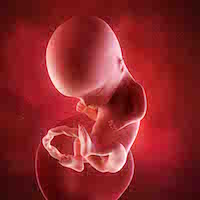18 Weeks Pregnant
You’re at week 18, and your pregnancy is progressing nicely. You are close to half way through, which means you’ll little bundle will be here before you know it. Don’t be surprised if you feel excited about meeting your baby but also a little nervous about giving birth.
What’s happening with your body?
 During week 18, you may notice a few new symptoms. Some women start to get leg cramps somewhere in their second trimester. The painful spasms, which run up and down the calves, can occur anytime day or night, but seem to be most intense when you’re lying down trying to sleep. Great right? Just what you need.
During week 18, you may notice a few new symptoms. Some women start to get leg cramps somewhere in their second trimester. The painful spasms, which run up and down the calves, can occur anytime day or night, but seem to be most intense when you’re lying down trying to sleep. Great right? Just what you need.
The exact reason for cramps is not clear. Doctors think it could be from compression of blood vessels or increased weight. Either way, leg cramps area a bummer.
There may be a few things you can do to decrease cramps. Try light stretching exercises before bed. If a cramp hits while you’re lying down, straighten your leg and flex your toes forward and back. Applying a heating pad may also work. Be sure to drink enough water, since dehydration can also lead to leg cramps.
You might also start to notice your ankles and feet are becoming swollen, especially at the end of the day. The swelling is usually due to excess fluid that is circulating through your body. It might be a good time for a little pregnancy pampering from your partner in the form of a foot massage.
Although cankles, as they are sometimes called, are making it hard to wear certain shoes, they are harmless. But if you notice your face and hands also swelling noticeably, call your healthcare provider. The swelling may be nothing to worry about. But sudden edema can also be a symptom of a condition called preeclampsia, which can occur during pregnancy and lead to complications for you and your baby.
What’s happening with your baby?
 Your baby is roughly 14 centimeters, which is about the size of a pepper or sweet potato. Although she still has a way to go before she has those adorable, chubby baby cheeks, she is starting to gain a little baby fat.
Your baby is roughly 14 centimeters, which is about the size of a pepper or sweet potato. Although she still has a way to go before she has those adorable, chubby baby cheeks, she is starting to gain a little baby fat.
Baby’s nerves are becoming more complex, and they are now covered with myelin. Myelin is a substance that allows messages to travel from nerve to nerve.
Another cool development is your baby is starting to do more “baby-like” things, such as yawn. It’s no wonder he is yawning; he might be getting tired in there as he starts moving around a lot more. During week 18, your baby is getting stronger, so he can flex his legs and arms. In the next week or so, you may start to feel those little movements,
If you’re having a boy, his genitals can be seen on an ultrasound now. But when you have your ultrasound appointment, they may be hard to spot depending on his position. If you are having a girl, her fallopian tubes and uterus are now formed.
Things to keep in mind
Most prenatal healthcare providers will recommend a second-trimester ultrasound. If you have not had one yet, you may want to schedule it in the next week or so. Your doctor or midwife will often recommend you have the ultrasound between 18 and 22 weeks.
The test is considered non-invasive and is performed using a transducer, which is placed on top of your belly to see inside your uterus. You will likely be instructed to drink a certain amount of water before the test and hold off on peeing until it’s over. You need a full bladder to push the uterus up, which makes it easier to see your baby.
A second-trimester ultrasound is performed as a routine screening to check in on your little one. An ultrasound will estimate your baby’s size and check to see if she is developing properly. The position of the umbilical cord and placenta are also checked.
But the best part is, you’ll get to see your baby! In many cases, you can also find out of you are having a boy or a girl. Keep in mind, your little peanut may be positioned in such a way that his/her gender may still be a mystery. The ultrasound technician will also provide you with a keepsake photo of your pride and joy so you can show him/her off.